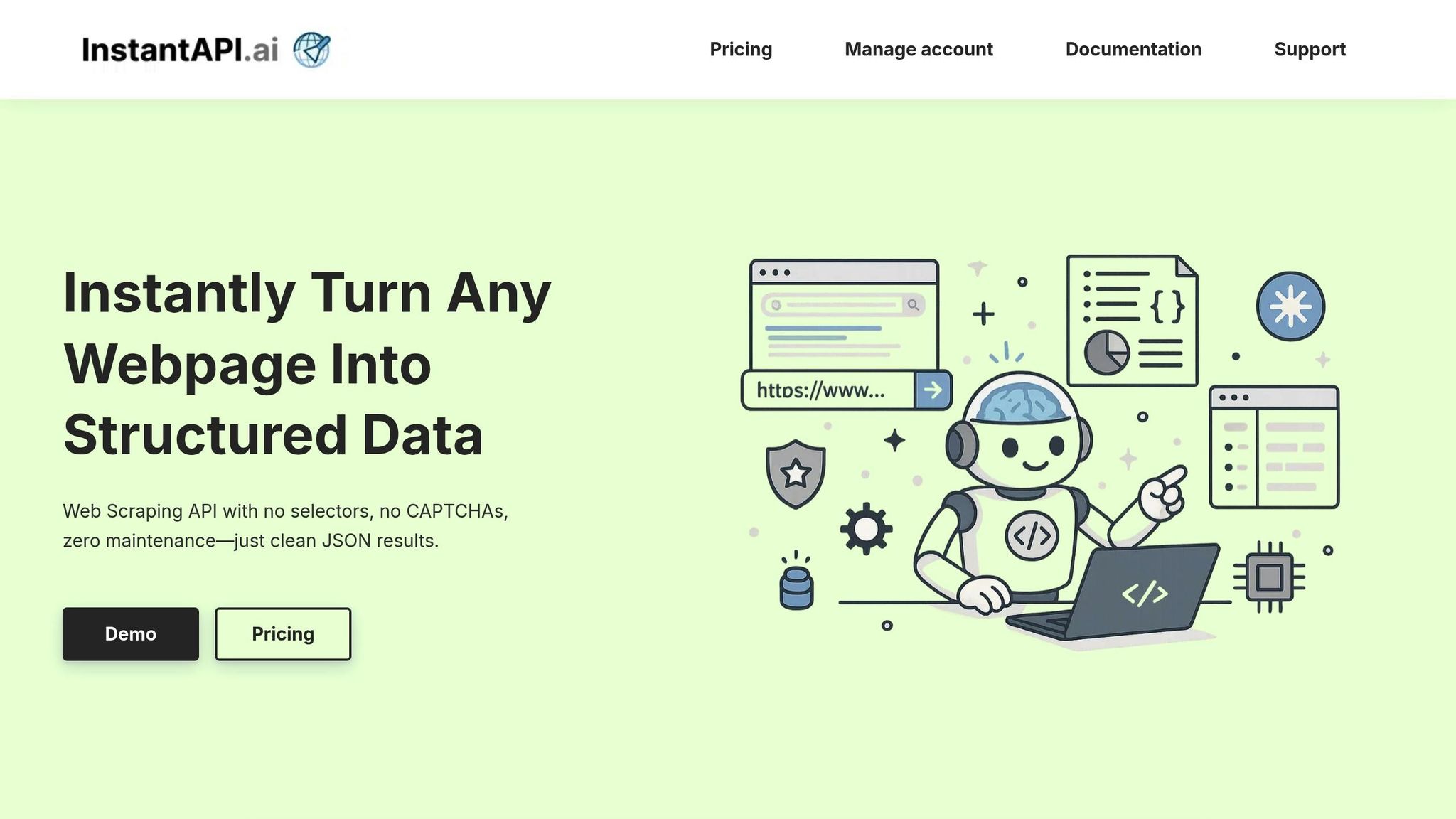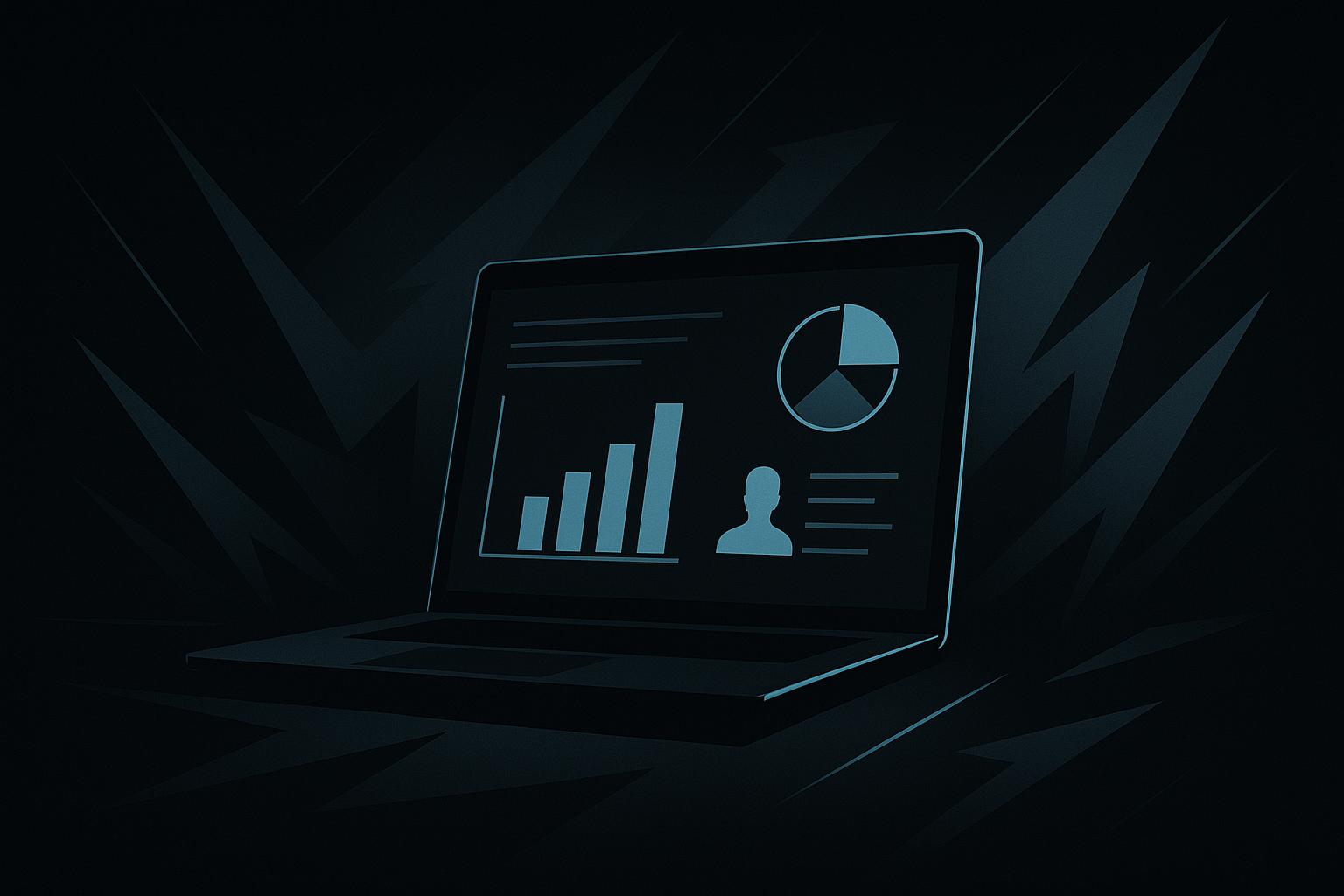Web scraping is transforming logistics by providing real-time data that helps companies make faster, smarter decisions. Here's how it improves operations:
- Price Monitoring: Automatically track competitor pricing and market rates.
- Supply Chain Visibility: Get live updates on shipments, inventory, and delays.
- Route Optimization: Analyze traffic, weather, and port congestion for efficient delivery routes.
- Competitor Analysis: Gather insights on pricing, services, and customer feedback.
Tools like InstantAPI.ai simplify data collection with features like CAPTCHA bypass, geotargeting, and structured output formatting, enabling seamless integration into logistics systems. With the U.S. logistics market growing rapidly, web scraping is becoming essential for staying competitive and improving efficiency.
SupplySeer - Solve Real-World Supply Chain & Logistics ...
Web Scraping Benefits in Logistics
Web scraping provides real-time data that helps logistics companies make smarter, faster decisions. Instead of relying on outdated reports or manual processes, businesses can use this technology to access accurate, up-to-date information. Here’s how web scraping improves logistics operations across key areas.
Supply Chain Tracking
Efficient supply chains rely on real-time shipment tracking. Web scraping monitors shipment statuses, transit times, and potential delays across various carriers and platforms. By combining GPS tracking with environmental sensors, companies can safeguard cargo by identifying conditions that might affect shipment quality.
"Real-time shipment tracking is no longer just an option for companies - it's a critical part of maintaining an efficient and resilient supply chain." - Antonis Karampourniotis, Impactograph
With GPS tracking and web scraping, logistics companies gain:
- Real-time location updates
- Instant alerts for delays
- Insights into bottlenecks
- Monitoring of environmental conditions affecting shipments
Price Management
Web scraping simplifies price management by automating the collection of freight rates, fuel surcharges, storage fees, and service costs. This ensures companies stay competitive and adjust pricing strategies quickly.
Route Optimization
Web scraping enhances route planning by analyzing:
- Traffic Conditions: Live updates on road closures and construction
- Weather Patterns: Forecasts that could impact delivery schedules
- Port Congestion: Real-time insights into port delays and capacity
- Alternative Routes: Viable detours and their effect on delivery timelines
Competitor Analysis
Staying ahead in the logistics market - expected to hit $1.73 billion by 2030 - requires competitive intelligence. Web scraping tracks competitors’ pricing, services, and customer reviews, giving businesses the insights they need to stay competitive.
Common Uses in Logistics
Web scraping plays a critical role in helping logistics companies streamline operations. Here's how it's being applied to improve efficiency and decision-making.
Price Monitoring
Web scraping allows companies to keep tabs on competitor pricing, ensuring they stay competitive in the market. It also helps identify trends and adjust strategies effectively.
- Automate competitor price tracking: Regularly gather data from competitor websites to understand pricing across different channels.
- Analyze and compare: Evaluate scraped data alongside internal rates to detect pricing patterns and shifts in competitor strategies.
- Make data-driven adjustments: Leverage dashboards to translate insights into actionable pricing changes.
Freight Rate Analysis
By automating the collection of shipping rates from various carriers, web scraping provides real-time insights that help optimize shipping costs.
"Computers can handle huge sets of data at a time, which would otherwise be impossible to humanely take into a single decision-making process. This is why Artificial Intelligence is a boon to Supply Chain Management." - Maruti Techlabs
Supply Chain Planning
Web scraping supports better supply chain management by tracking key metrics and conditions, such as:
- Supplier performance
- Inventory levels
- Lead times
- Production schedules
- Market demand trends
This data helps fine-tune inventory management, forecast demand, and improve communication with customers.
Customer Updates
Real-time shipping updates are made possible through web scraping. By automatically collecting and processing shipping status data, companies can send timely notifications, improving customer experience and service efficiency.
sbb-itb-f2fbbd7
Web Scraping Setup Guide
Setting up web scraping for logistics operations requires careful planning and the right tools to ensure reliable data collection. Here's a guide to help you implement a solid web scraping solution.
Using InstantAPI.ai

InstantAPI.ai simplifies logistics data collection with tools specifically designed for the industry. Its AI-powered platform allows you to define custom data formats using JSON schemas, making it easier to extract shipping rates, inventory details, and carrier updates.
Key features include:
- Global geotargeting for collecting international shipping data
- JavaScript rendering to handle dynamic web pages
- CAPTCHA bypass for uninterrupted scraping
- Structured output formatting for easy system integration
"After trying other options, we were won over by the simplicity of InstantAPI.ai's Web Scraping API. It's fast, easy, and allows us to focus on what matters most - our core features." - Juan, Scalista GmbH
Data Integration Steps
To maintain data quality and meet U.S. privacy standards, integrate scraped data into your systems in an organized way. Here's how:
- Define Data Structure: Create a standardized schema that matches your system's requirements, ensuring all collected data is formatted consistently.
-
Configure API Endpoints: Set up endpoints for different data types, such as:
- Shipping rates and transit times
- Inventory levels
- Carrier tracking details
- Market pricing information
-
Implement Data Validation: Establish rules to ensure data accuracy:
- Verify formats
- Check for valid ranges
- Identify duplicates
- Log errors for troubleshooting
Setting Collection Schedules
Once your data is integrated, schedule regular scraping to keep your information current. Proper scheduling prevents overloading target websites and minimizes risks like IP blocking. Follow these tips:
- Spread requests across time zones to avoid detection
- Rotate proxies to mask scraping activities
- Add delays between requests
- Monitor website response times and adjust schedules as needed
InstantAPI.ai offers a pay-per-use pricing model at $0.005 per page scrape, allowing you to scale your data collection efforts based on seasonal needs and market trends.
Web Scraping Methods
Web scraping has come a long way, especially in addressing the demands of modern logistics. Today’s methods focus on providing fast, accurate, and cost-effective data solutions.
Method Comparison
Building on the setup steps, comparing different methods can help clarify the technical aspects of effective web scraping. Several factors influence performance and reliability, and automated tools like InstantAPI.ai offer features tailored to tackle common logistics challenges.
These tools not only provide real-time data access but also integrate smoothly with existing logistics systems:
Key Technical Features:
- Advanced rendering to handle complex logistics platforms
- Intelligent proxy systems for global data access
- Automated handling of authentication processes
- Enterprise-grade data formatting for seamless compatibility
For logistics companies managing large-scale operations, automated tools bring powerful capabilities. For instance, InstantAPI.ai boasts a 99.99%+ success rate, making it possible to track shipping rates across multiple carriers in real time.
| Feature | Impact on Logistics Operations |
|---|---|
| Automated Proxy Management | Ensures reliable global shipping data collection without IP blocks |
| JavaScript Rendering | Captures dynamic rate calculators and tracking updates accurately |
| CAPTCHA Bypass | Maintains uninterrupted data flow for time-sensitive planning |
| Structured Output | Simplifies integration with TMS and WMS systems |
These strategies are essential for improving logistics operations. In the U.S., automated web scraping tools are particularly effective at managing diverse data sources while adhering to local regulations.
Data Collection Features:
- Geotargeting for precise regional pricing
- Support for custom JSON schemas to standardize data
- Unlimited concurrent requests for handling large data volumes
- Human-like behavior to ensure consistent and reliable collection
The ability to process large amounts of data accurately and efficiently has made automated tools indispensable for optimizing supply chains and planning routes effectively.
Web Scraping's Role in U.S. Logistics
Web scraping is playing a crucial role in transforming the U.S. logistics industry by streamlining operations and improving decision-making. Projections highlight massive growth in AI-driven logistics, with the market expected to jump from $12 billion in 2023 to $549 billion by 2033.
The impact on supply chain visibility is striking. Gartner reports that in 2023, half of multinational corporations invested in real-time transportation visibility systems. Additionally, the American Transportation Research Institute found that 82% of logistics companies anticipate AI and machine learning will significantly influence their operations within the next three years.
Here are some real-world examples showcasing the power of AI-driven web scraping in logistics:
- FourKites: Tracks 3 million daily shipments using AI-powered real-time tracking systems.
- Logiwa: Enhances inventory management by analyzing sales data and trends with AI.
- Coyote Logistics: Integrates shipping data with external variables for proactive supply chain management.
These examples highlight how companies are increasingly relying on automated data collection to stay ahead. In fact, forecasts suggest that by 2025, 80% of logistics firms will adopt AI solutions to improve inventory visibility.
With U.S. online sales expected to surpass $1 trillion in 2023, web scraping has become a critical tool for businesses. Automated data collection allows companies to quickly respond to market changes and maintain a competitive edge through real-time insights.
FAQs
How can web scraping improve supply chain visibility for logistics companies?
Web scraping improves supply chain visibility by delivering real-time data on key aspects of logistics operations. This includes tracking shipments, monitoring inventory levels, and identifying potential delays or disruptions. By consolidating data from multiple sources, logistics companies can gain a clearer, more comprehensive view of their supply chain, enabling faster and more informed decision-making.
Additionally, web scraping allows businesses to proactively spot trends, such as changes in freight rates or delivery patterns, helping them stay agile and competitive in a rapidly changing market. The result is a more efficient and transparent supply chain process, leading to better customer satisfaction and operational efficiency.
What challenges might logistics companies face when using web scraping technologies?
Logistics companies can face several challenges when adopting web scraping technologies. One common issue is encountering anti-scraping measures, such as IP blocking, rate limits, or CAPTCHAs, which may require the use of proxies or CAPTCHA-solving tools.
Another challenge is handling websites with dynamic content, complex HTML structures, or pagination, which often necessitates advanced tools like headless browsers and precise parsing techniques. Additionally, frequent changes to website layouts can disrupt scrapers, requiring regular updates and error monitoring to maintain functionality.
Despite these challenges, with the right strategies and tools, web scraping can deliver significant value by providing actionable data for optimizing logistics operations.
How can logistics companies stay compliant with privacy laws when using web scraping technologies?
To stay compliant with privacy laws while using web scraping, logistics companies should focus on a few critical practices. First, ensure only publicly available data is collected and avoid scraping personal or sensitive information unless you have explicit permission. Document your data collection methods thoroughly to maintain transparency.
Additionally, secure all collected data with encryption and limit access to authorized personnel only. Regularly review your practices to align with regulations like the General Data Protection Regulation (GDPR) or other applicable laws. By prioritizing ethical and legal data collection, you can mitigate risks and maintain trust in your operations.


